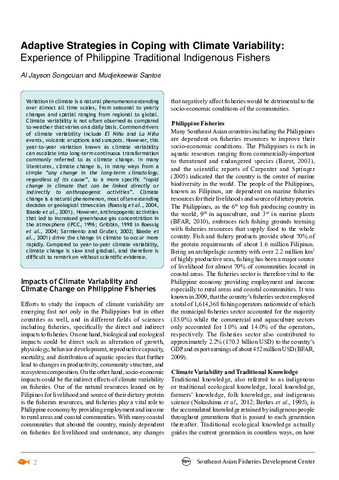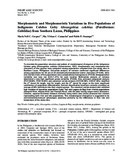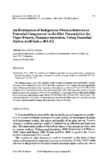| dc.contributor.author | Añano, Julie Andrea | |
| dc.contributor.author | Aya, Frolan | |
| dc.contributor.author | Corpuz, Mark Nell | |
| dc.contributor.author | Romana-Eguia, Maria Rowena R. | |
| dc.contributor.editor | Romana-Eguia, Maria Rowena R. | |
| dc.contributor.editor | Parado-Estepa, Fe D. | |
| dc.contributor.editor | Salayo, Nerissa D. | |
| dc.contributor.editor | Lebata-Ramos, Ma. Junemie Hazel | |
| dc.date.accessioned | 2016-01-20T17:42:16Z | |
| dc.date.available | 2016-01-20T17:42:16Z | |
| dc.date.issued | 2015 | |
| dc.identifier.citation | Añano, J. A., Aya, F., Corpuz, M. N., & Romana-Eguia, M. R. R. (2015). Optimization of feeding and growth conditions for hatchery-bred larvae of indigenous Philippine silver perch, Leiopotherapon plumbeus (Perciformes: Terapontidae). In M. R. R. Romana-Eguia, F. D. Parado-Estepa, N. D. Salayo, & M. J. H. Lebata-Ramos (Eds.), Resource Enhancement and Sustainable Aquaculture Practices in Southeast Asia: Challenges in Responsible Production of Aquatic Species: Proceedings of the International Workshop on Resource Enhancement and Sustainable Aquaculture Practices in Southeast Asia 2014 (RESA) (p. 327). Tigbauan, Iloilo, Philippines: Aquaculture Department, Southeast Asian Fisheries Development Center. | |
| dc.identifier.isbn | 9789719931041 | |
| dc.identifier.uri | http://hdl.handle.net/10862/2799 | |
| dc.description | Abstract only. | |
| dc.description.abstract | The Philippine silver perch, locally known as ayungin, is an endemic fish species and is considered as a potential candidate for aquaculture and for stock enhancement. However, high mortality associated with early larval stages presents a significant bottleneck to its latent commercialization. Culture experiments considered interactions among prey proportions, growth conditions and their consequences on fish growth performance and survival. Two phases of the experiment were conducted: (1) a short duration feeding trial utilizing different prey proportions of Brachionus calyciflorus and Moina macrocopa and (2) an indoor larval rearing technique that ensured optimum growth and survival of juveniles. Findings of this research will be used to propose an efficient rearing strategy addressing the aquaculture of this indigenous species. | |
| dc.language.iso | en | en |
| dc.publisher | Aquaculture Department, Southeast Asian Fisheries Development Center | en |
| dc.subject | Philippine silver perch | |
| dc.subject | Larval stages | |
| dc.subject | Rearing strategy | |
| dc.subject | Indigenous | |
| dc.title | Optimization of feeding and growth conditions for hatchery-bred larvae of indigenous Philippine silver perch, Leiopotherapon plumbeus (Perciformes: Terapontidae) | en |
| dc.type | Conference paper | en |
| dc.citation.spage | 327 | |
| dc.subject.asfa | larval stage | en |
| dc.subject.asfa | rearing techniques | en |
| dc.subject.asfa | indigenous organisms | en |
| dc.citation.conferenceTitle | Resource Enhancement and Sustainable Aquaculture Practices in Southeast Asia: Challenges in Responsible Production of Aquatic Species: Proceedings of the International Workshop on Resource Enhancement and Sustainable Aquaculture Practices in Southeast Asia 2014 (RESA) | en |
| dc.subject.scientificName | Leiopotherapon plumbeus | en |



